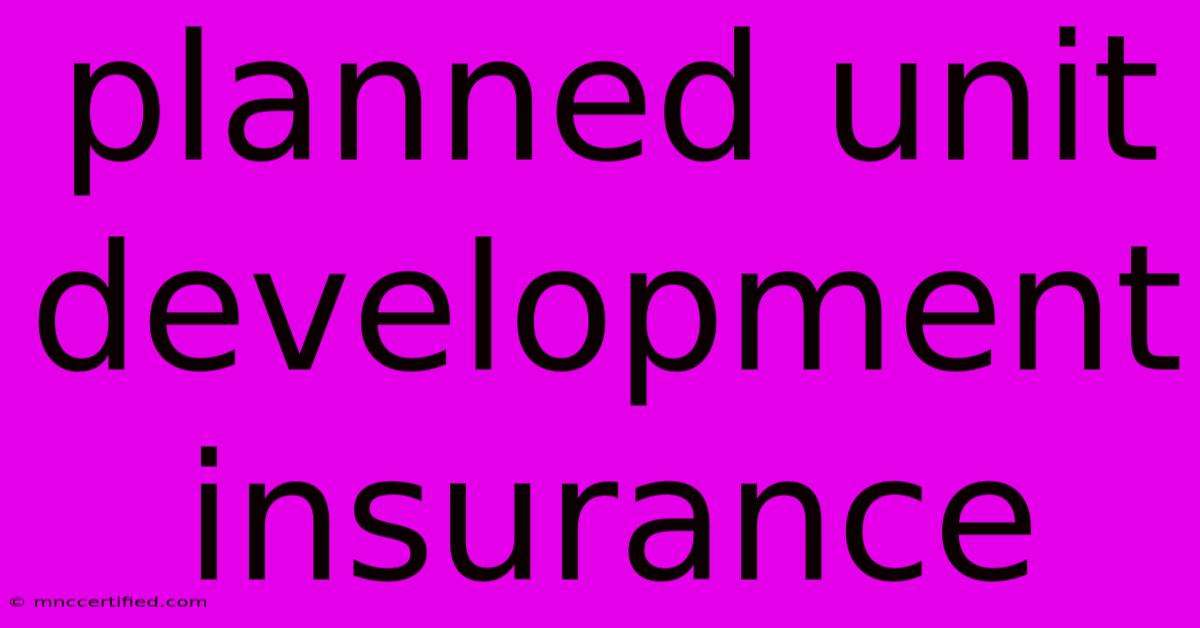Planned Unit Development Insurance

Table of Contents
Planned Unit Development (PUD) Insurance: A Comprehensive Guide
Planned Unit Developments (PUDs) are unique real estate entities, blending the best aspects of single-family homes with the convenience and amenities of apartment living. This hybrid nature necessitates a specialized approach to insurance, different from traditional homeowner's or condo insurance. Understanding the nuances of PUD insurance is crucial for both developers and residents. This comprehensive guide will delve into the specifics of PUD insurance, clarifying its complexities and helping you find the right coverage.
What is Planned Unit Development (PUD) Insurance?
A PUD, often referred to as a planned community, comprises individually owned units situated within a larger, master-planned development. These developments typically include shared amenities like swimming pools, clubhouses, and landscaping. PUD insurance is designed to address the shared responsibility for these common areas and the individual ownership of the dwelling units. Unlike a traditional condo, where the association usually handles all insurance, PUD insurance often involves a combination of individual and association coverage.
Key Differences from Condo and Homeowner's Insurance:
- Shared Responsibility: PUD insurance involves both individual unit owner policies and a master policy for the common areas. This shared responsibility differentiates it from standard homeowner's or condo insurance.
- Coverage Variations: The extent of coverage for common areas and individual units can vary significantly depending on the PUD's governing documents and the insurance policies chosen.
- Specific Exclusions: Certain aspects, like structural damage to individual units, may or may not be covered depending on the specific policies in place. Carefully reviewing the policy documents is crucial.
Understanding the Two Main Components of PUD Insurance
PUD insurance typically consists of two main components:
1. Individual Unit Owner's Policy:
This policy protects your individual unit from damage or loss due to covered perils, much like a standard homeowner's insurance policy. However, coverage for the structure itself may be limited depending on the PUD's governing documents. Key aspects to consider include:
- Dwelling Coverage: This covers damage to the structure of your individual unit.
- Personal Property Coverage: This protects your belongings inside the unit.
- Liability Coverage: This protects you against lawsuits if someone is injured on your property.
Keyword: PUD homeowner's insurance
2. Master Association Policy (Common Area Coverage):
This policy covers the common areas and amenities within the PUD. This includes:
- Building and Structures: Coverage for the clubhouse, swimming pool, landscaping, and other common elements.
- Liability: Protection against lawsuits arising from accidents or injuries in common areas.
Finding the Right PUD Insurance: Key Considerations
Choosing the right PUD insurance requires careful consideration of various factors:
- Review the PUD's Governing Documents: These documents outline the responsibilities of the association and the unit owners regarding insurance.
- Compare Quotes from Multiple Insurers: Don't settle for the first quote you receive. Shop around to compare coverage options and prices.
- Understand Coverage Limits and Exclusions: Pay close attention to the specifics of each policy, including what is and isn't covered.
- Assess Your Individual Needs: Your specific needs will depend on the value of your unit and the level of risk you're willing to accept.
- Consider Additional Coverage Options: Explore options like flood insurance, earthquake insurance, or additional liability coverage as needed.
Frequently Asked Questions (FAQs)
Q: Who is responsible for paying for PUD insurance?
A: Typically, the individual unit owners pay for their individual unit policies, while the PUD association pays for the master policy covering common areas.
Q: What happens if the association's insurance doesn't cover a significant claim?
A: In such cases, the unit owners might be assessed special assessments to cover the shortfall. This is why having sufficient coverage is crucial.
Q: Can I get PUD insurance if I'm renting a unit?
A: Yes, you may be able to obtain a renter's insurance policy to protect your personal belongings. However, the PUD association still maintains the master policy for the common areas.
Q: What if I have a dispute with my insurance company?
A: You should first contact your insurance agent or company directly to resolve the issue. If you're unable to resolve it, you might need to consider filing a complaint with your state's insurance department.
Conclusion
Navigating the world of PUD insurance can be challenging. Understanding the nuances of both individual unit owner policies and the master association policy is essential for protecting your investment and ensuring peace of mind. By carefully reviewing your governing documents, comparing quotes, and understanding your coverage, you can find the right insurance protection for your PUD home. Remember to proactively address any questions with your insurance provider and the PUD association to avoid future complications.
Keyword variations used throughout the article: PUD insurance, planned unit development insurance, PUD homeowner's insurance, planned community insurance, PUD association insurance, common area insurance
This article uses various SEO techniques such as header tags (H2, H3), bold text, keyword variations, FAQs, and a clear structure to improve search engine ranking and user experience. Remember to conduct thorough keyword research for your specific target audience to further optimize this article. Also, remember to build high-quality backlinks from reputable sources to improve your off-page SEO.

Thank you for visiting our website wich cover about Planned Unit Development Insurance. We hope the information provided has been useful to you. Feel free to contact us if you have any questions or need further assistance. See you next time and dont miss to bookmark.
Featured Posts
-
Homeowners Insurance Ocala Florida
Nov 16, 2024
-
New Tate Mc Rae Album 3 Arena Date Set
Nov 16, 2024
-
Hyundai Gap Insurance Phone Number
Nov 16, 2024
-
Campbells Wake Forest Volleyball Transition
Nov 16, 2024
-
Campbell Reflects Wake Forest Volleyball
Nov 16, 2024